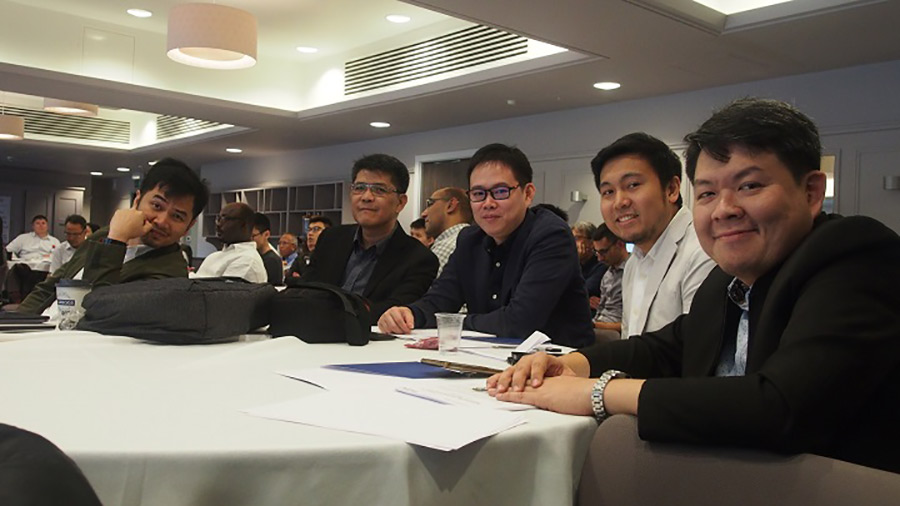What makes a top university? The University of Santo Tomas (UST) knows that educators are at the backbone of its efforts to make a difference in academia. This aligns with the criteria of the Times Higher Education and Quacquarelli Symonds, as both institutions put more weight into teaching and academic reputation when it comes to university rankings.
Through transnational education (TNE), UST realizes its vision of empowering its College of Architecture teachers.
UST, the top performing school in the January 2024 licensure exams for architects, is poised to keep its leadership in the field as four of its educators put their TNE degrees to full use. Architect David Yu finished the dual PhD in Built Environment/Architecture from UK’s University of Reading (UoR) and UST in 2022. The program aims to instill multi-disciplinary approaches on urban design, providing training in fields like social science and environmental engineering. It seeks to develop a deeper understanding of various factors in architecture, including quality of life and sustainability and resilience of communities.
UoR, which Times Higher Education ranked 6th in the UK for research power on Architecture, Built Environment and Planning, has helped Thomasian educators deepen their established expertise in the field. In the process, it gave TNE graduates, like Yu, world-class credentials. Now, the UST instructor is deep at work, finding answers to problems in both the national space and in his classroom.
“My personal experience doing my research changed how I view urban development. It’s no longer solely about imposing grand designs but fostering a collaborative process that empowers communities,” said Yu. “This shift translates directly into my teaching of architecture students that investigates questioning the conventional norms in architecture and urban design. I challenge students to critically examine traditional urban development models and consider the social dynamics within informal settlements.”
Yu’s transnational education was made possible by the partnership of the British Council and the Commission on Higher Education (CHED). This initiative, aligned with the Transnational Educational Higher Education Act, connects Philippine and UK universities to provide Filipinos a chance to secure a local postgraduate credential and an international qualification without needing to study full-time in the UK. Through his research under TNE, Yu uncovered the role of informal settlement in architecture—and how knowledge in this aspect can help governance.
“This area of study fascinated me because it revealed the agency and creativity of residents who often shape their own environments,” he explained. “We can develop more inclusive and people-centered approaches to urban design. This knowledge can empower both residents and policymakers to create more sustainable and equitable cities for the future.”
Architects John Ong and Joey De Vera, Yu’s colleagues at the UST College of Architecture, also earned the same dual PhD degree. With their upgraded credentials, all three have taken on new roles in the college. Yu is now program coordinator, Ong wears the hat of coordinator of assessments, while De Vera has been named coordinator of the college’s Building Technology and Building Utilities Cluster.
Ong and De Vera are focused on applying their TNE learning in the field of research, a key element in a thriving academic institution. “I learned how profound the approach of British education in the realm of research. My methods in reading and writing have immensely improved from my experience in studying PhD in the University of Reading,” Ong said.
“My TNE experience has opened up the expansive realm of research and this has inspired me to do more research work related to my profession,” De Vera added.
Architect Brian Lim, another TNE graduate from UST College of Architecture, has in fact seen his research work featured in the 2023 conference of the Industrial Society for Industrial Ecology, held in Leiden, Netherlands.
The UST educators are pouring their expertise and experience to make the Dominican institution the country’s top architecture school. They also hope their research can help change the world for the better. “My ultimate goal is to publish my findings and contribute to the field of urban design,” said Yu.
De Vera, in his case, seeks to study more about artificial intelligence. “In the coming years, I see my field evolving at an unprecedented rate and pace given the ever-developing world of AI. It has practically revolutionized both the teaching and design professions, opening up new possibilities for innovation and collaboration.”
UST is only one of the university partners of the British Council, which is continuously at work to open more TNE opportunities.





